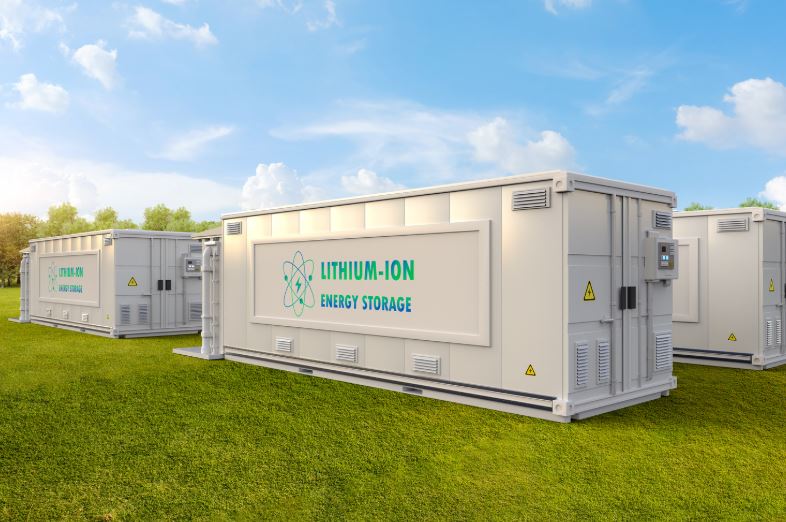Germany’s northern grid is set for another capacity boost as Eco Stor advances its 103.5-MW/238-MWh battery energy storage project in Schuby, Schleswig-Holstein, marked by the delivery of its main transformer in August. The nearly 130-tonne unit, sourced from Hungary, is the largest single component of the installation and a critical link between the local medium-voltage network and the 110 kV transmission system.
At full capacity, the Schuby facility will hold enough power to supply around 170,000 households for two hours, underscoring how battery storage is shifting from pilot-scale deployments to grid-relevant assets in Germany’s energy transition. The project follows the commissioning of a near-identical 103-MW/238-MWh system in nearby Bollingstedt earlier this year, reflecting an emerging strategy to pair large-scale batteries with northern Germany’s wind-dominated grid.
Grid Pressures and Storage Deployment
Northern Germany has long struggled with renewable curtailment, particularly during periods of high wind output and low demand. In 2023 alone, grid operators curtailed more than 8 TWh of renewable electricity—equivalent to roughly 1.5% of total German power consumption—primarily in Schleswig-Holstein and Lower Saxony. Storage facilities such as Schuby aim to absorb part of this surplus and release it during evening peaks, reducing strain on transmission lines that remain bottlenecked despite ongoing north-south corridor expansions.
The timing is strategic: by 2026, Germany expects to add more than 20 GW of new wind and solar capacity annually, according to Bundesnetzagentur projections. Without sufficient storage, much of this generation risks being curtailed, undermining both system efficiency and investor returns.
Technical Build-Out and Challenges
Eco Stor’s Schuby system will comprise 64 lithium-ion battery containers and 32 additional units housing inverters and auxiliary transformers, spread across 1.2 hectares. While the technical configuration aligns with industry norms, the facility’s scale places it among the largest battery assets in Europe.
However, reliance on lithium-ion chemistry raises questions about long-term sustainability and cost exposure. Lithium and cobalt prices, though currently off their 2022 peaks, remain volatile and vulnerable to supply chain disruptions. The German market has so far leaned heavily on lithium-ion, but industry voices are increasingly pressing for diversification into alternative chemistries such as sodium-ion or flow batteries to mitigate risk.
Another challenge lies in duration. At two hours, Schuby is designed for daily arbitrage and peak shaving rather than long-duration balancing. While this meets near-term needs, the system may prove insufficient as Germany’s share of variable renewables surpasses 80% in the 2030s, a shift that will demand storage capable of bridging multi-day gaps.
Policy and Market Signals
The project also illustrates how private developers are stepping into roles traditionally occupied by transmission system operators (TSOs). While Germany’s TSOs remain focused on grid reinforcement and congestion management, BESS projects like Schuby offer faster deployment and localized flexibility. Yet regulatory frameworks remain fragmented. Current German rules do not fully integrate batteries into capacity or ancillary services markets, limiting potential revenue streams beyond energy arbitrage.
Still, investor appetite is evident. The Bollingstedt and Schuby projects signal confidence in Schleswig-Holstein’s storage economics, leveraging high renewable penetration and frequent congestion pricing to monetize battery assets. If proven financially viable, these projects could set a precedent for further rollouts across wind-heavy regions in northern and eastern Germany.
Industry Outlook
By early 2026, when Schuby is scheduled to go online, Germany’s installed battery storage capacity is projected to exceed 10 GW, up from less than 5 GW in 2023. While still small compared to demand-side needs, these assets will play an outsized role in absorbing curtailed renewable output and reducing balancing costs.
Eco Stor’s expansion in northern Germany highlights the tension at the core of Europe’s energy transition: massive renewable build-outs require equally rapid deployment of storage and flexibility resources, yet technology choices, regulatory frameworks, and investment signals remain unsettled. Schuby’s progress shows momentum, but also underscores the complexity of scaling battery storage to a level commensurate with Germany’s climate targets.





